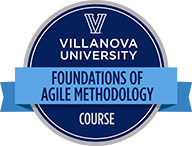Who Should Register?
If you’re a professional working in any level of government or in healthcare, finance or other business sectors, you can benefit from earning a Certificate in Agile and the Villanova Professional Certification in Agile designation. The program also helps you prepare for certifications including PMI-Agile Certified Practitioner (PMI-ACP)® from PMI and Professional Scrum Master™ (PSM) from Scrum.org. Any organization aiming to increase teamwork and improve overall results is also encouraged to consider this process improvement training for its workforce.
PMI-Agile Certified Practitioner (PMI-ACP) and PMI-ACP are registered marks of the Project Management Institute, Inc.


